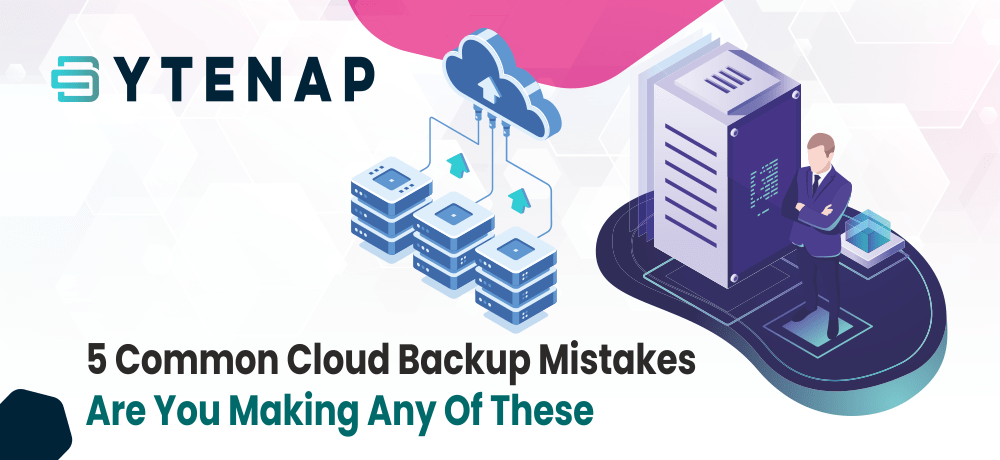This blog post will be regarding 5 common cloud backup mistakes that you should avoid.
Do you create or maintain cloud backup for your business site? Don’t know what security complications you may face in 2020 and the future?
Nowadays, as more and more businesses are making their online presence, data protection and disaster recovery have become quite essential. Enterprise data is expanding at a higher rate than ever before, to an extent that several conventional backup solutions cannot make it up and that’s where the cloud comes in.
Cloud storage with its massive flexibility, capacity, and ease of connectivity makes it a great option for website backup. However, if you are not careful and make any of the cloud backup mistakes, you will soon regret it.
Top 5 Cloud Backup Mistakes You Should Avoid
Watch out for the 5 backup mistakes while you create, monitor, and maintain cloud backups.
Ignoring the Encryption and Doing Unencrypted Backups
In recent years, the number of data security breaches has been on a rise. You should treat this as a warning to your business. The cloud is as secure as you make it. Your backups are at risk if you don’t encrypt data and control with 2FA (two-factor authentication).
You may also want to refer our guide on “website backup importance and Codeguard“.
Encrypted Backups
Regardless of where your backups are stored, you can never ignore its security. If you store your backups without encryption, there are high possibilities of backup being compromised.
As ransomware attacks are becoming more common each passing day, if backups are not encrypted, your data could be stolen or deleted.
Encryption plays a crucial layer of safety for your backup that you must have in place. With prominent backup solutions such as Acronis Cyber Backup and Codeguard Website Backup, all backups are encrypted.
Note: Don’t forget your backup key as without it you cannot access or restore your backup.
Multi-Factor Authentication (MFA)
While connecting to your cloud services, you must make sure to enable Multi-Factor Authentication (MFA) or Two-Factor Authentication (2FA).
MFA secures login to your backup system with extra methods of authentication. For instance, you will receive a text message or email to confirm the login. With MFA, hackers won’t be able to gain illegitimate access to your server.
Failure in Testing and Monitoring Backups
Though the cloud takes away a huge deal of overhead, you can’t always expect your system to work properly. It is crucial that you observe and monitor your potential issues to make sure everything is working as planned.
In past, there have been several instances where an organization was the target of attack. And while they looked for restoring backups, they discovered that backups were either corrupted or lacking a few key elements.
To avoid such unwanted events, you must regularly backup and monitor event logs. Systems should be maintained and storage space should also be monitored.
Try monitoring the following:
- File access logs
- Monitor if the files are being backed up normally or not.
- Suspicious activities like bandwidth surge, duplication of files, etc
Not Planning For Disaster situation and Disaster Recovery
Automated disaster recovery can be great for seamless operations of the business however, having a plan for a disaster is crucial to maintain backups.
Individuals should know how to plan for a crisis. If you don’t make plans for such a crisis then you will have to face longer downtime.
By knowing how to access your backups or who needs to deploy a recovery plan, will make the disaster recovery process smooth and less time-consuming.
In short, if you don’t have a plan for disaster recovery, you could end up your precious time and money.
Also Read: 3 Best WordPress Backup Plugins
Concentrating Only On Your Files
In case you are just backing up particular files and folders, you may be missing out on a few crucial data that help minimize the damage of a compromise.
Ensure to maintain a backup of databases, software, logs, and other essential files. Any missing data from the backup can possibly come back to haunt you.
There may be a tiny lacking ingredient from your backup that leaves an essential configuration missing and can point to reworking entire applications.
For a speedy recovery, one must have backups that cover each part of your infrastructure.
Poor Scheduling of Backups
It is crucial to identify and understand what various backup schedules you have and what you will need in a compromise or disaster situation.
There are several ways for scheduling backup and each one is unique from others. The backup plan depends on how your servers are performing and the amount of data that you’re processing
If your server or site is getting huge traffic, database changes and contains essential records or financial data then you must take backups more frequently.
Incremental backups are a popular choice for several circumstances. Such backups are only made while data changes and without the need to re-copy the whole system
Suggested For Further Reading
Looking for a Complete Backup Solution? Check Out Our Codeguard Automatic Backup Plans Now!








